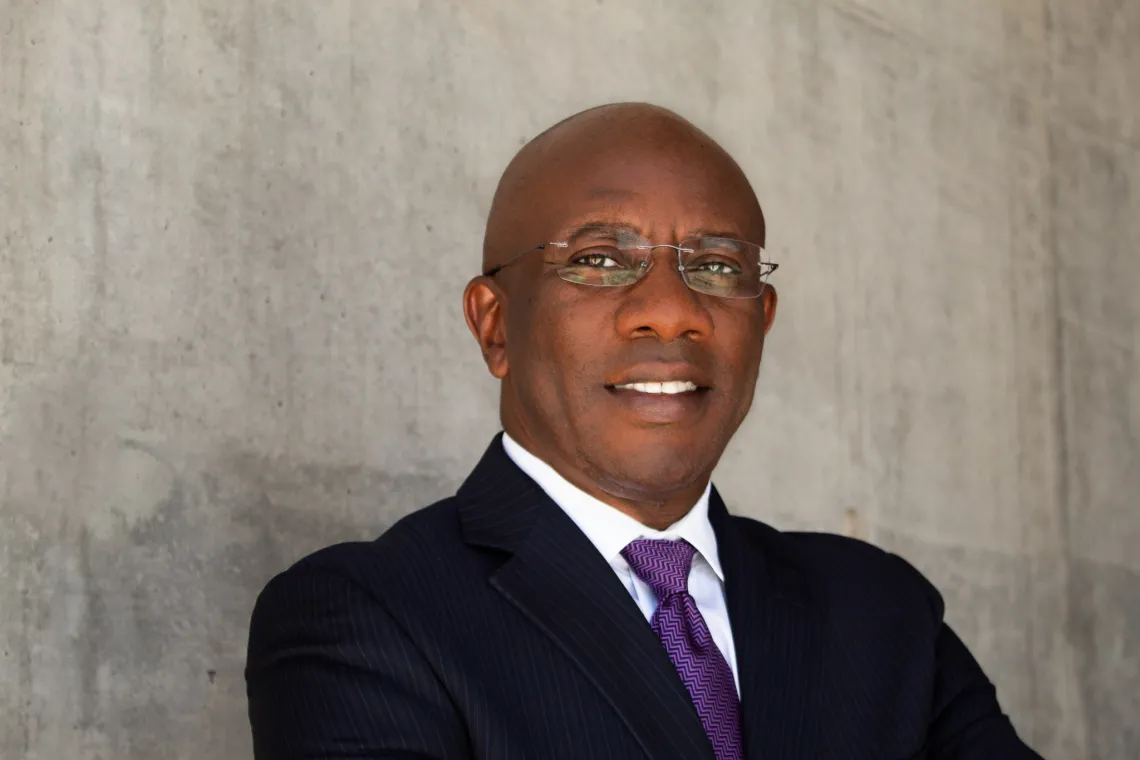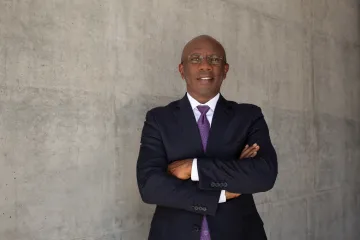Diversity and Inclusion Spotlight: Dr. Valentine Nfonsam

Dr. Valentine Nfonsam is an associate professor of surgery and interim chief of the Division of Surgical Oncology.
Where are you from?
I was born in Cameroon. Cameroon is in central Africa. I was born in a small town called Buea. Cameroon is actually a bilingual country, just like Canada. But the difference between Cameroon and Canada is that 80% of Cameroon is French-speaking and 20% is English-speaking. So, it’s the opposite of Canada. It was a former British and French colony, that’s why. Those are the remnants of colonization. I grew up in the English-speaking part of Cameroon, even though my parents were from the French-speaking part. I went to school in Cameroon, and right after high school, I went to Nigeria for college. And then I came to the United States. My port of entry was Michigan. I came right after college, and then I went to graduate school for two years at Michigan State, followed by medical school at the University of Illinois, Chicago.
What brought you to Tucson?
I came here for a job interview right after my fellowship. I had three or four jobs lined up already. I flew to Tucson from Tampa. While I was on the plane, I looked down and I said to myself Hell no am I going to a place like that. It was dry; it was a desert; there was no grass. But you know, I had an amazing interview with the chair of surgery at that time who was trying to recruit me. And I thought this place was the perfect fit for me in terms of my career. And that’s why I moved to Tucson.
What does diversity & inclusion mean to you?
Well, I live diversity and inclusion. By that I mean I firmly believe in the value of diversity. I believe that having a diverse workforce, especially in the medical arena, is very important. It brings a lot of value. It improves patient wellbeing. There’s a diversity of ideas. And then, it also improves productivity. So, diversity and inclusion is really, really important to me. I believe in opening doors for other people. I believe in not only inviting people to the party, but also inviting them to dance. So, it’s not only about improving diversity; it’s also including people. I believe in all types of diversity, from gender diversity to race diversity to diversity in socioeconomic background. If you come from a poor white neighborhood, you have almost the same challenges as somebody who comes from a poor black neighborhood. And so, when I think of diversity, I think of a really, truly more diverse environment and the value that it brings.
What makes you diverse?
I would say what makes me diverse is my background and also my perspective. I come from a background that is unique; number one, I wasn’t born here, so I bring a different perspective from that regard. Number two, I come from a very poor background, which allows me to understand people who come from that background. Number three, I traveled the world extensively, so I understand a whole lot of other people’s points-of-view. And, more importantly, what makes me diverse is that I am absolutely open-minded. So, for me, I am very malleable and adaptable. I am open to other people’s perspectives. To me, a lack of openness stifles diversity.
What are some of the obstacles you‘ve had to overcome on your journey?
In my journey, I‘d say most of the difficulties I‘ve encountered are due to the fact I came from a poor socioeconomic background and less about my race or anything else. I would say navigating college, going to college with no money, that was a significant disadvantage. Having parents who are not educated was a significant disadvantage. Having parents who could not dream big, who if I had been a school teacher in a little village in Cameroon, they would have considered that success. Trying to dream bigger than my parents could dream was a significant challenge. Ending up in an environment that was so culturally different was a challenge.
But I can tell you that with all the challenges I have faced, as I‘ve navigated these, I‘ve also had a lot of support from places where I did not expect it. The one challenge I‘ve never seemed to have, only because I just don’t see it, is being considered different. I‘ve never felt that in my life. Maybe because I choose not to feel that way or not to see that way. But if I look around, despite all the challenges, there still are a lot of wonderful, good people who want to see me succeed. A lot of people. And they‘ve helped me a lot along the way.
What strengths do you feel like your diversity has given you?
A lot of things. I‘m always open, and I‘m eternally positive. I‘m always open to endless possibilities. Two, I‘m very, very adaptable and malleable. I have core values, but there are very few values that I cannot negotiate. I always try to look at other peoples perspectives, no matter what. It’s taught me resilience; I think I‘m tougher than a whole lot of people. I‘ve faced all kinds of ups and downs in my life and challenges, and I‘m just tougher. It’s made me really believe in myself and know that there’s nothing I can’t make happen. Nothing that I can’t make happen. So, resilience, adaptability, looking at other peoples perspectives, and really being open-minded. And I believe there’s only one way to make things happen, and that’s hard work.
What do you feel is the importance of diversity and inclusion in surgery?
I think it’s really important to have diversity in not only surgery, but medicine as a whole. There are several really good reasons why diversity is important. It actually adds significant value. A Hispanic patient talking to a Hispanic doctor is more comfortable than if he or she were talking to another doctor. And that’s just the reality of it. An African American patient feels more comfortable dealing with an African American physician. The more diversity we see in the healthcare workforce, the better the impact on the patient.
Let me tell you this: I‘m sitting in clinic talking to my patients. My patients love me, whether they‘re Hispanic or white or black. I‘m sitting there with a Hispanic patient who adores me. But if I have a Hispanic resident there, you can actually see their eyes open a little wider. There’s value there. 40% of our population in Arizona is Hispanic. Our workforce should reflect that. There’s absolutely value in diversity.

How do you hope to see the field of medicine become more diverse and inclusive?
I do lead a few national taskforces on diversity and inclusion. Our hope is to increase and improve the pipeline so we can have a more diverse workforce, especially in the healthcare system, that will reflect our community population. And we do that in so many ways. We start from improving the pipeline all the way from high school and college to encourage diverse people to train for our workforce.
Number two, opening doors. I think it’s important to recognize the fact that there’s still a lot of implicit bias. So, the way we help some people is to open doors for them, give them a chance. And opening doors is actually a really important aspect of diversity.
Three, recognizing the fact that we all have biases. Everyone has biases. We have different backgrounds. So, we need to educate the public more about implicit bias. If you know that you have these biases, you can actually try to overcome them.
I think the future is exciting. I‘m really excited about it. We attempt to make progress; even if we pull back sometimes, I think we‘re headed toward the right direction.

